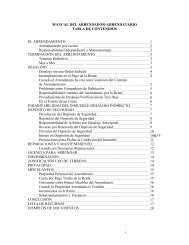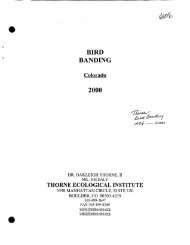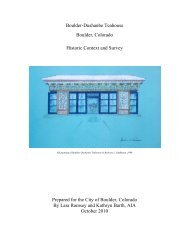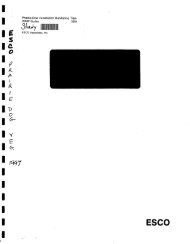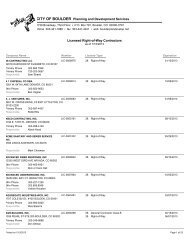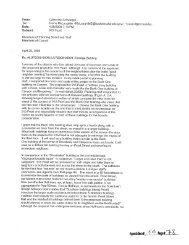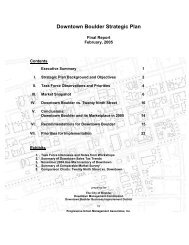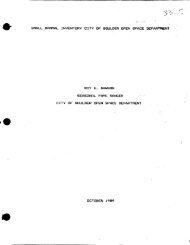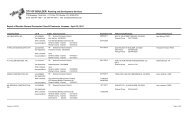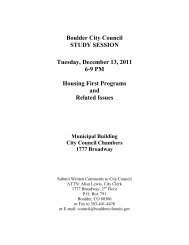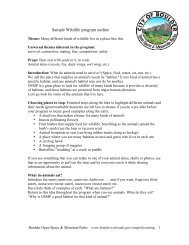Suzy Ageton George Karakehian KC Becker Tim ... - City of Boulder
Suzy Ageton George Karakehian KC Becker Tim ... - City of Boulder
Suzy Ageton George Karakehian KC Becker Tim ... - City of Boulder
You also want an ePaper? Increase the reach of your titles
YUMPU automatically turns print PDFs into web optimized ePapers that Google loves.
Public Comment<br />
Attachment G<br />
The following written comments are from Jackie Thompson, owner <strong>of</strong> the <strong>Boulder</strong> Creek<br />
Winery<br />
Summary <strong>of</strong> Land Use Issues<br />
Wineries<br />
1. Zoning Designation: "Industrial Manufacturing" vs. "Agri-tourism"<br />
The first issue thwarting the success <strong>of</strong> wineries in <strong>Boulder</strong> County is the "manufacturing"<br />
zoning designation assigned to it for lack <strong>of</strong> anything more fitting under current Land Use Code.<br />
(Keep in mind that <strong>Boulder</strong>'s codes were written in the Post-Prohibition era during which the US<br />
wine industry had not yet recovered, and wineries had not yet re-established anywhere in the<br />
state <strong>of</strong> Colorado). This land use designation is ill-fitting for several reasons:<br />
� Over the past twenty-five years the wine industry, nationwide, has evolved from a wineas-beverage<br />
industry to a wine-as-activity industry ... Agri-tourism.<br />
� Wine production, and more specifically, grape processing, is an agricultural activity that<br />
is largely seasonal in nature and does not involve the intensity <strong>of</strong> activities <strong>of</strong>ten<br />
associated with industrial manufacturing operations.<br />
� Tasting room activities, a common component <strong>of</strong> winery operations, are not at all<br />
"manufacturing" in nature, and <strong>of</strong>ten include educational components such as tours,<br />
historical and scientific displays, and hands-on activities such as traditional grape stomps,<br />
classes, and workshops.<br />
� Winery tourism is a thriving national industry that is best located where tourists are likely<br />
to find it.<br />
� Wineries are highly sought-after venues for high-end events such as weddings, charity<br />
fund-raisers, and private events <strong>of</strong> all sorts. Industrial parks are not proper settings for<br />
such events.<br />
2. "Colorado Wine Trail" Signage<br />
Compounding the issue <strong>of</strong> our forced location in Industrial Manufacturing parks (where out-<strong>of</strong>town<br />
guests are least expecting to find us) is the repeated denial by <strong>Boulder</strong> County <strong>of</strong> our<br />
requests for a "Colorado Wine Trail" sign, part <strong>of</strong> the Colorado TODS Program (Tourist<br />
Oriented Directional Signs).<br />
The "Colorado Wine Trail" signage program is a collaborative effort <strong>of</strong> the Colorado<br />
Department <strong>of</strong> Agriculture and the Colorado Tourism Office designed to promote and facilitate<br />
tourist visits to winery tasting rooms. It is fashioned after similar, highly successful, Wine Trail<br />
programs in dozens <strong>of</strong> other states across the US.<br />
For over a decade, Colorado wineries in all other areas <strong>of</strong> the state have been granted approval<br />
for wine trail signs as part <strong>of</strong> the Colorado TODS Program. <strong>Boulder</strong> County, however, has twice<br />
denied our formal request for a Wine Trail sign on Highway 119.<br />
Agenda Item 5B Page 39



